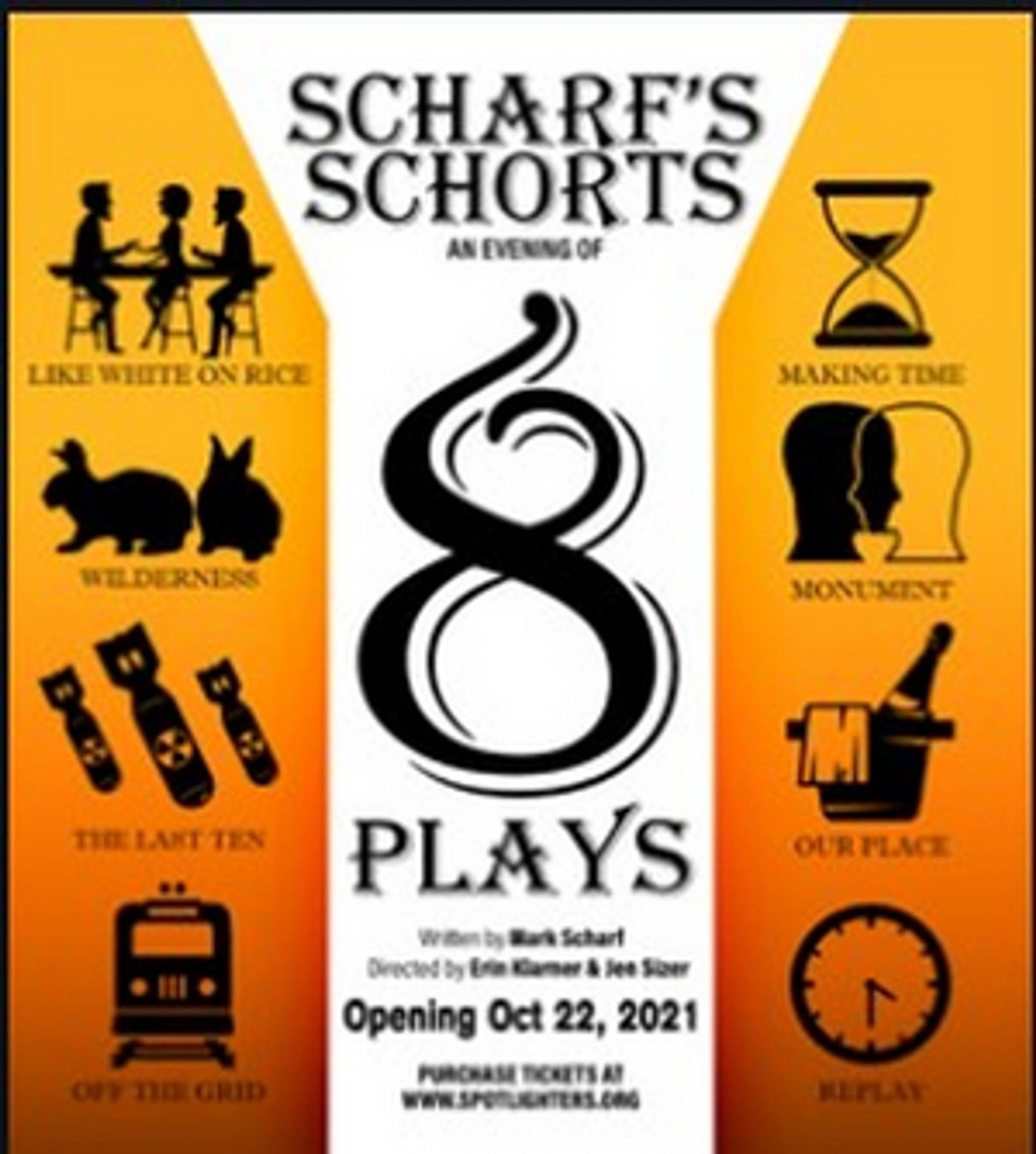Review: Perhaps a Little Too Short?
SCHARF'S SHORTS at Spotlighters Theatre

The 10-minute play is a distinct subgenre, as different from the one-act or full-length drama in construction, demands, and ambitions as a short story is from a novella or novel. Yet even so a playwright attempting to create a 10-minute play must do all the work of a playwright, and make things happen, and surprise and engage the audience in some way, within that narrow scope. Baltimore-based playwright Mark Scharf is evidently a master of the craft, as witnessed by the collection of eight examples of the subgenre packaged and presented by Spotlighters as Scharf's Shorts. Collectively they do all that is required.
Scharf in program notes says that they are "about our human connections in the face of mortality." I don't see that formula applying to the funniest play in the show, Like White on Rice, a simple but beautifully-executed stunt in which all the dialogue consists of clichés, adages, stock phrases, and quotations. The stunt is about the stunt, nothing more profound. (Which is just fine.) Nor do I see the suggested theme applying to Off the Grid, an affecting encounter between a homeless woman (Terri Laurino) and a commuter trying to avoid being panhandled (Sam David), where the human connections theme applies, but not, so far as I could see, in the "face of mortality." Similar comment could be made of Making Time, where connections are forged between two random commuters (Laurino again and Nick Cherone) waiting for a bus that never arrives. Nor does it apply to Wilderness, a portrayal of a neighborhood's Not In My Back Yard dynamic with an emphasis on the "yard" part. (A death does provide some of one character's motivation, though not in a way that builds a theme.)
But Scharf's remark does seem to apply to the remaining four plays, which oddly I found less satisfying than the others. In two of them, the dialogue ultimately proves to be between a living person and a dead one or the memory of a dead one, and the plays explore the connection that made the dead one significant to the surviving one. But the reveal in each play that one of the characters lives no more absorbs too much of our attention, and the relationship part too little. In the other two plays, Our Place and The Last Ten, death is in prospect, not yet arrived, but the connections between the characters, highlighted by the impending doom, are again the point. Still, we barely get to witness the former history and the current dynamic between the characters before the blackout. I'll grant that these four plays do seem, consistent with Scharf's remark, to express a conviction that the absurdity of decline and death should not be taken to deprive human connections, however fragile and temporary, of some kind of transcendent and perhaps enduring meaning. But the 10-minute structure hardly allows enough character development to make these rather large points.
10-minute plays are customarily showcased in groups written by diverse playwrights, which tends to increase their appeal. As with a candy assortment, we get to try them all, and it's a part of the fun. Variety is the spice of 10-minute play showcases. When an audience is exposed to short multiple short takes from a single playwright, though, the variety diminishes, while, if the playwright has some big subject to address, the discipline of the 10-minute play begins to loom large. In 10 minutes, deep themes are hard to convey adequately.
The same poignant note is struck in each of the four plays here that really concern the death-and-connections theme, but that note never seems adequately supported. We can't and don't get to know the characters well, and hence we don't get to appreciate, as we are being encouraged to, the value of their connections that have been or shortly will be extinguished. At least we don't get to do it remotely as well as we would have in a full-length play. We are continually taking off but never enjoying the flight or the landing. The result can be a playwright undeservedly coming across as superficial, again and again. I wonder if something like that may not have happened here. I would really have chosen to know the characters and their situations better, if I could. But they were whisked away, victims of the 10-minute clock.
None of this should be taken as a critique of the Spotlighters' facility or staging. The space is perfect for 10-minute plays, which typically involve very small casts and minimal settings, emphasizing instead the prowess and versatility of the acting troupe involved. All these dynamics are accommodated here. There is also nothing to fault with this group of performers, which includes the above-mentioned actors plus Sean Eustis, Glen Charlow, Mike Papa and Beverly Shannon. Erin Klarner and Jen Sizer each very competently directed half of the plays.
Finally, Baltimore, it's time to come back to the theater, and this show would be a fine place to start. COVID protocols are in place (proof of vaccination must be provided, masking is required, and the air is rapidly replaced and ionized, which reportedly zaps the viruses). But if you're planning to resume your theatergoing here, hurry up; the last performance is November 7.
Scharf's Shorts: An Evening of 8 Plays, written by Mark Scharf, directed by Erin Klarner & Jen Sizer, through November 7, at 817 St. Paul Street, Baltimore, MD 21202. Tickets $10-$24, at www.spotlighters.org or 410-752-1225. Simulated smoking, adult situations.
Photo Credit: Katherine Lee
Reader Reviews

Videos

